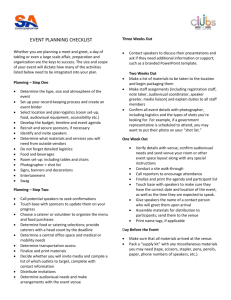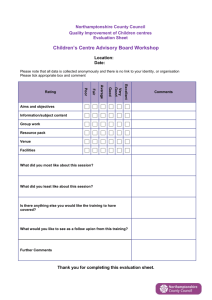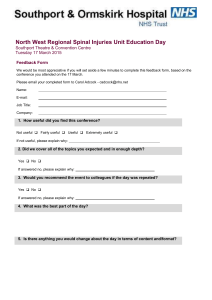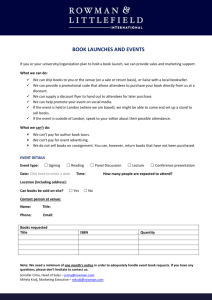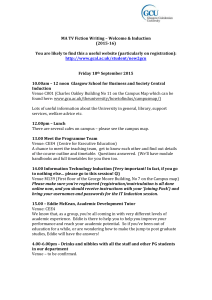Organising an event for able linguists
advertisement
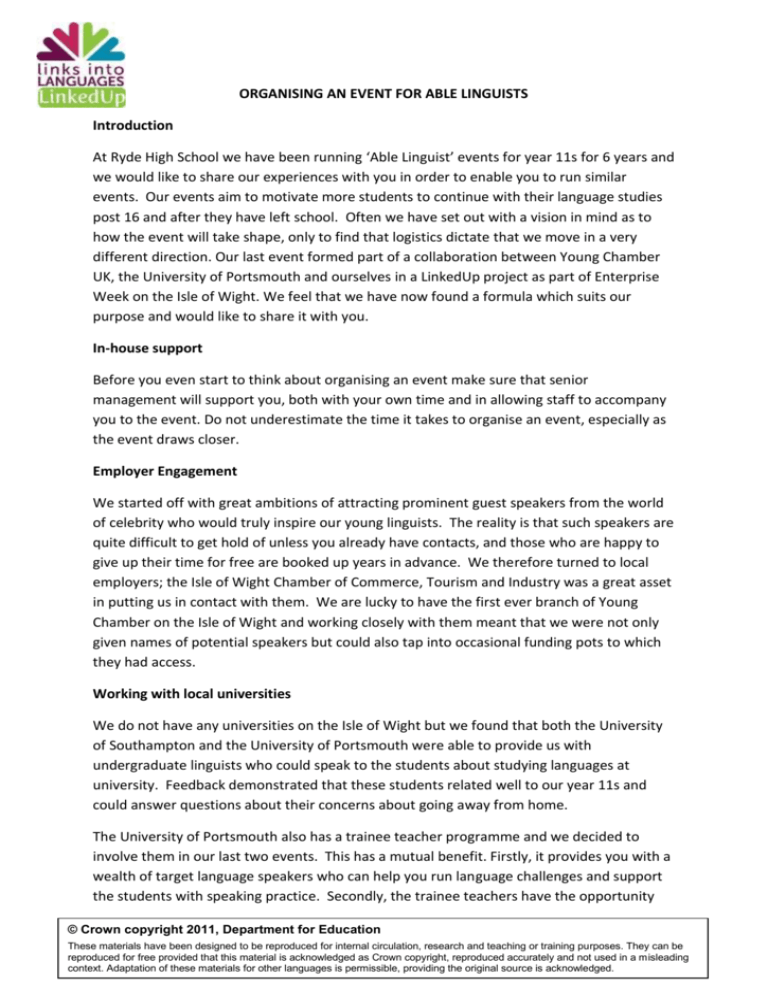
ORGANISING AN EVENT FOR ABLE LINGUISTS Introduction At Ryde High School we have been running ‘Able Linguist’ events for year 11s for 6 years and we would like to share our experiences with you in order to enable you to run similar events. Our events aim to motivate more students to continue with their language studies post 16 and after they have left school. Often we have set out with a vision in mind as to how the event will take shape, only to find that logistics dictate that we move in a very different direction. Our last event formed part of a collaboration between Young Chamber UK, the University of Portsmouth and ourselves in a LinkedUp project as part of Enterprise Week on the Isle of Wight. We feel that we have now found a formula which suits our purpose and would like to share it with you. In-house support Before you even start to think about organising an event make sure that senior management will support you, both with your own time and in allowing staff to accompany you to the event. Do not underestimate the time it takes to organise an event, especially as the event draws closer. Employer Engagement We started off with great ambitions of attracting prominent guest speakers from the world of celebrity who would truly inspire our young linguists. The reality is that such speakers are quite difficult to get hold of unless you already have contacts, and those who are happy to give up their time for free are booked up years in advance. We therefore turned to local employers; the Isle of Wight Chamber of Commerce, Tourism and Industry was a great asset in putting us in contact with them. We are lucky to have the first ever branch of Young Chamber on the Isle of Wight and working closely with them meant that we were not only given names of potential speakers but could also tap into occasional funding pots to which they had access. Working with local universities We do not have any universities on the Isle of Wight but we found that both the University of Southampton and the University of Portsmouth were able to provide us with undergraduate linguists who could speak to the students about studying languages at university. Feedback demonstrated that these students related well to our year 11s and could answer questions about their concerns about going away from home. The University of Portsmouth also has a trainee teacher programme and we decided to involve them in our last two events. This has a mutual benefit. Firstly, it provides you with a wealth of target language speakers who can help you run language challenges and support the students with speaking practice. Secondly, the trainee teachers have the opportunity © Crown copyright 2011, Department for Education These materials have been designed to be reproduced for internal circulation, research and teaching or training purposes. They can be reproduced for free provided that this material is acknowledged as Crown copyright, reproduced accurately and not used in a misleading context. Adaptation of these materials for other languages is permissible, providing the original source is acknowledged. not only to learn how to run such an event, but also to meet students who are truly motivated in their subject. Finding the right venue This can be tricky requiring a degree of flexibility. Do you match your event to a particular venue, or do you try and find a venue which will match your event? When looking for a suitable venue we would suggest the following: Get out of school if you can. Taking the students to a ‘posh’ venue and immersing them in a ‘conference’ style atmosphere, focuses them on the task. They appreciate the nice surroundings, especially the catering, and they feel that they have been selected for something special. Find a venue with a decent number of breakout rooms, equipment that works and good acoustics. Good internet access is handy but not essential and it is better not to depend on it. If you are running a task using laptops, ensure there are plenty of sockets and available extension leads. Make sure that you can go back nearer the time to talk through seating arrangements and that you will be able to get into the venue early that morning or even the night before to set everything up. Ask the venue to be flexible with timings for catering as you will invariably over/under-run. Make sure they are prepared to have water available throughout the day. Ideally find a venue which will invoice you for actual numbers on the day rather than on predicted numbers. If you are involving a number of schools, find somewhere central. We have used our local YMCA centre, a hotel, an arts centre, a Yacht Haven and a Cricket Club. Each has its own merits. Transport Arrangements Ensure you allow enough time for everyone to get there. If you arrange the transport for all of the schools involved, guest speakers and other participants, you will have more control over whether they arrive on time. Most guest speakers will expect their travel expenses to be met, so make sure that you have set this up with your finance department beforehand so that they are aware how to invoice you. This ensures that they can be paid promptly. Linking with other schools As a Language College we have been able to pay for the venue, catering, resources and transport for all of our events (but not cover) for the five participating high schools. This has 2 © Crown copyright 2011, Department for Education. This resource has been created through the LinkedUp Award Scheme. either been funded out of our Language College budget or through Young Chamber, Aimhigher, Routes into Languages or Links into Languages. This has meant that most years all five schools have participated as they only have to fund cover for one accompanying teacher. Without this funding we do not think that other schools would be able to participate. It is often a problem getting the final numbers to the venues in time and some schools have been known to drop quite dramatically in numbers between notifying the venue of final numbers for catering and the actual event. It may be worthwhile, therefore, charging a refundable deposit to schools to cover the costs you might incur for no-shows. Budget The venue can cost anywhere between £5 and £25 per person for room hire and catering. It is worth shopping around and again liaising with your local Chamber of Commerce who may be able to get you a better deal. We normally aim for 100 - 120 delegates in total. If you have a number of guest speakers and trainee teachers you are probably then looking at around 50 to 70 students. Coaches can work out expensive and with groups of 15-25 people coming from each school, you can double up. However, this can create a long journey for one school. Our costs this year were £450 for two coaches. You will need to budget for photocopying and resources as follows: Essential o Tasksheets o Agendas o Feedback sheets o Prizes if running challenges (these might be donated) o Name badges (approximately £7 for a pack of 24 plastic coated badges) Ideal Promotional folders for agendas and other relevant papers Goody bags with free pens and small promotional gifts Sweets for each table Timetable Obviously timelines will vary according to the programme you are running and the needs of your venue. However, here is a guideline as to how to set about your planning: 1. In the summer term preceding your event, ascertain a date with your partner schools which does not coincide with their own events, preferably before any year 11 option evenings which are taking place. This enables them to get the venue put on their school calendar. Our events have tended to be in late January but this year we also held one in November to coincide with Enterprise Week. 3 © Crown copyright 2011, Department for Education. This resource has been created through the LinkedUp Award Scheme. 2. Once you have your date then contact your chosen venue to see if it is available. If it isn’t you will need to decide which is more important, the participation of all the schools or the chosen venue. 3. If you are going to have promotional folders and gifts start to get your artwork sorted and place your order at least two months before the event. Internet agencies are usually very quick and can turn things around in a week, but local suppliers can take longer if they are busy and you don’t want to be panicking at the last minute. 4. Next contact your chosen speakers and other contributors so that you can produce a mini-flier to promote your event. This can take a while as you ascertain who is available. Trawl wide initially as there may be several people who cannot attend. 5. Send out your flier and your draft letter to participating schools with a deadline for when you will need to know their numbers, names and which languages they represent. 6. Provisionally contact transport providers according to estimated numbers. 7. About a month before the event it is a good idea to order your name badges and other resources such as paper and pens. Write a press release to your local newspaper inviting them along to take photographs. 8. About a week before the deadline gently remind the participating schools that you need numbers, names, medical and dietary information and languages spoken urgently. Realistically, you will probably only receive all of this information a few days before the event. 9. A week before, update the venue on the numbers and dietary information and arrange to visit them to talk through seating plans. At this stage you can start to print or write your name badges, allocate students to groups, buy any last minute resources and confirm transport arrangements. 10. On the day, remember to take plenty of photographs and videos and record students’ comments while they are doing certain activities. 11. Post event ensure that all guest speakers have had their expenses paid, analyse the feedback forms and write an evaluation. Thank you letters/e-mails are often something we forget after the event, so try and do these the next day. It’s quite nice to issue certificates for participating students and send them to schools. Letters Home We produce a standard letter home which we e-mail to all schools. This can be found in Appendix A and includes a request for us to be able to take photos and to use them for promotional materials. Risk Assessments A risk assessment for the event can be found in Appendix B. Separate risk assessments can be done for transport, also in Appendix B. 4 © Crown copyright 2011, Department for Education. This resource has been created through the LinkedUp Award Scheme. Useful Documents Registration form or signing in sheet for health and safety but also so that you can monitor who came and issue any certificates after the event. If you are running a challenge, then a list of teams and team labels for the tables. Spare copies of the programme for the day for the venue, guest speakers and the local press. A sample agenda can be found in Appendix C If you are running a ‘round robin’ of events it is useful to include a chart of when and where each activity will take place and a list of who is in each group in their information packs. See example below: Timeslot 3.30-3.50 3.50-4.10 4.10-4.30 4.30-5 A CV Jupiter room Tourism exercise Main Hall Secret Services ICT suite Feedback B Secret Services ICT suite CV Jupiter Room Tourism exercise Main Hall Feedback C Tourism exercise Main Hall Secret Services ICT suite CV Jupiter room Feedback Group A Group B Group C List of student names List of student names List of student names Workshops and Challenges Samples of workshops and challenges we have used can be found in separate documents. 5 © Crown copyright 2011, Department for Education. This resource has been created through the LinkedUp Award Scheme. Appendix A Letter home Dear Parent/Carer Your Future in Languages Event for Year 11 Friday 26th November 2010 Newport County Cricket Club We would like to invite your son/daughter to participate in the above event which will take place at Newport County Cricket Club from 9am to 3pm. This event will provide your child with an insight into how languages can be used in the workplace and will give them the opportunity to hear guest speakers from industry and university talking about the importance of languages in today’s world. The programme will include a language challenge set around a real scenario based on a cruise ship. The winners of the challenge will have the opportunity to visit a cruise ship in port. This will be a very useful experience for any student with the ability to continue studying languages as part of the post-16 programme. We strongly recommend that your child take up this opportunity. In order to reserve a place, please return the enclosed parental consent forms by 21st October. A coach will be arranged to transport students to and from the event and the times of departure and arrival will be announced on our return after Half Term. Our school has been given 15 free places and these will be allocated on a first come first served basis. We look forward to receiving your forms and thank you for your support. Yours sincerely Mrs Suttmann International Centre Manager 6 © Crown copyright 2011, Department for Education. This resource has been created through the LinkedUp Award Scheme. I would be delighted for my child to attend the Language Event on 26th November 2010. Name of Student………………………………………………………………………. Tutor Group……………………………………………………………………………. I am happy for my child to be photographed at the ‘Your Future in Languages Event’* I do NOT wish my child to be photographed at the ‘Your Future in Languages Event’ on 26th November.* * Please delete as appropriate Please provide details of any medical conditions or dietary requirements of your child you would like us to be aware of. Signed……………………………………………………………………….. Please print name…………………………………… 7 © Crown copyright 2011, Department for Education. This resource has been created through the LinkedUp Award Scheme. Appendix B Hazards: Offsite Journey - General Risk Assessment Event Associat ed Risks: Who is at Risk? (see below) All group Car Park Fatality – Head Injury Internal Injury Falls onto roadway. All group Stairways Fatality – Head Injury Trips Falls All group Toilet facilities Fatality – Injury Violence Abduction Refreshment facilities List existing controls or attach information. Identify action needed for risks for which these controls are not adequate: Use additional Risk Assessments covering journeys: Bus/Coach & Ferry. Trained First Aider present. Mobile phones Supervised groups Keep well away from roadside and moving vehicles. Head count. Responsibility: Group Leader Group Leader, group supervisor. Supervision. Single file on stairways. No running. Awareness of any potential trip hazard. Group Leader Pupils Supervision Pupils advise supervising adults when they are going to the washrooms so that this can be monitored. Attendant adult Fatality – Anaphyla ctic shock Choking Pupils Allergy pupils Aware of student’s allergies and that medication is available. Trained First Aider present. Group Leader Unsupervised pupil movements Fatality – Injury Violence Abduction Pupils Pupils are not allowed to move outside the complex without adult supervision. Group Leader Emergencies Fatality – Fire Bomb threat Other….. Fatality – Loss of time All group Stay in manageable group sizes, follow venue evacuation guidance/rules. Regular head counts. Group leader to coordinate groups. Group Leader, group supervision. All group Use and carry emergency procedure from Offsite Leadership guidance. Group Leader No emergency procedure 8 © Crown copyright 2011, Department for Education. This resource has been created through the LinkedUp Award Scheme. Risk Assessment Coach Hazards: Associated Risks: Who is at Risk? List existing controls or attach information. Identify action needed for risks for which these controls are not adequate: Organisation & Supervision. Briefing prior to activity. Mobile communications. Adult:Pupil ratio is correct. Group contact list. Distribution of Risk Assessment Supervision. Reduce exposure (waiting) time. Keep well away from roadside and moving vehicles. Responsibility: Offsite Journey General Fatality(see below) All group Bus Stop / Bus Station Fatality – Head Injury Internal Injury Falls onto roadway. Children Boarding / Disembarking Fatality – Head Injury Trip, Fall down stairways. Children Supervision. Adults helping at doorways. Check numbers ON & OFF. Group Leader, Supervision Vehicle Movement Severe – Head injury Children Supervision. Children to be properly seated at all times. Group Leader, Supervision Lack of Emergency Procedure Fatality Severe Injury Lost Child Children Emergency Procedure in Offsite Leadership Manual. Group Leader Headteacher, Group Leader Group Leader, Supervision 9 © Crown copyright 2011, Department for Education. This resource has been created through the LinkedUp Award Scheme. Appendix C Sample Programme ‘Your Future in Languages’ Friday 26th November 09.00 to 15.00 9.00 – 9.15 Arrival and Registration 9.15 – 9.20 Welcome and housekeeping, Pat Suttmann 9.20 – 9.40 Michelle Russell, Island Games 9.40 – 10.00 Louisa Paston 10.00 – 10.15 Introduction of the Language Challenge, Raz Hussain Solent EBP 10.15 – 10.30 Break 10.30—13.30 The Challenge 12.30-13.30 Working Lunch 13.30—14.20 Presentations 14.20 – 14.40 Luke Kerr—Gurit 14.40– 15.00 Announcement of winners and close. Newport County Cricket Ground 10 © Crown copyright 2011, Department for Education. This resource has been created through the LinkedUp Award Scheme.

